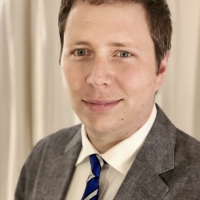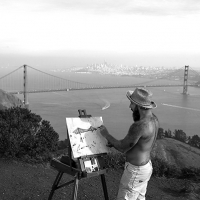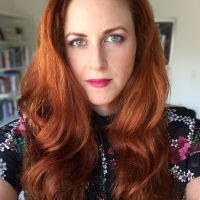Power and the Audiovisual
As part of the Global Urban Humanities Initiative Colloquium called Reading Cities, Sensing Cities we have asked students and visitors to write responses to each of the weekly guest lectures.
October 23, 2014
Urban Space, Spectacle, Memory and Music in Nineteenth-Century Vienna
Nicholas Mathew (Music)
Presentation available here.
Video of the conversation available here.
Mathew presented on the role of music and sound in the emergence of modern civic sensibilities in Napoleonic Vienna, and how printed music came to shape a new politics of urban pedestrianism.
by Brandon Harrell
On October 23, Professor Nicolas Mathew gave us a taste of the Congress of Vienna as it was post-Napoleonic War. He challenged his audience, our classroom, to focus on the words “spectator” and “audience” as he explained how the Congress would organize grand events in urban spaces to acknowledge the elite heads of state while also arousing the masses. The large spaces, once bustling the day before with activity, were converted into pavilion-like landscapes where all things regal were admired. Again, I thought to myself, dramaturgy. I am being compelled to view the city as a spectacle where everyday life is a performance, where the image of the city is mediated by a binary social relationship, where individual choices are made in the sphere of production and consumption. In this case, the state of Vienna was producing an image, organized with symphonic arrangements to be consumed by the masses. The music would blast, sonic boom after sonic boom, and the words (in German) would describe and glorify particular events, solidifying them in historical memory. These elite narratives were more aural fantasy than anything and, as the music boomed over the spectators they were not being shaken into obedience, but becoming aware of themselves as an audience en masse. The public became aware of its own presence. Individual privacy of expression is gone when one becomes usurped by the crowd. All is laid bare; what would be a passive, disorganized sound becomes an active clamor of the masses.
The urban experience is fragmented and dramatic, and as Mathew focused deeper on the music and grand public performances of Vienna, I could not help but ask, “Where does state-sponsored music and performance fit into our cities today? How do we produce sound and communal identity through performance theory?” Knowing that the U.S. government maintains power norms through the commodification of resources and space, I believe that sound and image cannot be separated from space. We often don’t think of the commodification of land and space as directly affecting our audiovisual opportunities and what those audiovisual opportunities can do for us but let’s ponder for a moment: as more and more land becomes privatized, there are fewer public spaces in which to perform, to act, to play, to be free, physically. The cars, planes, drones, and construction drown out the music, the rhythms, the voices, the stories; that car blasting Drake or Lil Wayne as it winds down Telegraph only passes by for a second. Then, the roars and bustle are quickly back at the forefront-–that is the norm. Billboards, fast-food signs, curb paint and road paint, streetlights and the entangled web of telephone poles and wires, all distract from our relationship with space, passively extracting opportunities for collective voice and expression.
Where and how can we reclaim space, reclaim our voice? All of my examples come not from those in power, but the oppressed. Performing participatory pedestrianism–from the gypsy, flamenco culture of Andalusia, Spain, to the Black, hip-hop culture of North America–-they all screamed, “Fight the power! Pa’lante siempre!” By existing in these spaces we reclaim them. That message juxtaposed against the monolithic drone of commerce and mainstream media kind of summarizes U.S. society today…
Here is some local inspiration… a response to the death of a young, Black boy named June.
Brandon Harrell is a graduate student in the Master of City Planning program at the UC Berkeley College of Environmental Design.
The Sound of Urban Spectacle
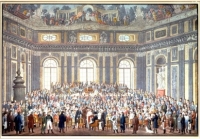 As part of the Global Urban Humanities Initiative Colloquium called Reading Cities, Sensing Cities we have asked students and visitors to write responses to each of the weekly guest lectures. October 23, 2014 Urban Space, Spectacle, Memory and Music in Nineteenth-Century Vienna Nicholas Mathew (Music) Presentation available here. Video of the conversation available here. Mathew presented on the role of music and sound in the emergence of modern civic sensibilities in Napoleonic Vienna, and how printed music came to shape a new politics of urban pedestrianism. by Swetha Vijayakumar “The spectacle is not a collection of images; rather, it is…
As part of the Global Urban Humanities Initiative Colloquium called Reading Cities, Sensing Cities we have asked students and visitors to write responses to each of the weekly guest lectures. October 23, 2014 Urban Space, Spectacle, Memory and Music in Nineteenth-Century Vienna Nicholas Mathew (Music) Presentation available here. Video of the conversation available here. Mathew presented on the role of music and sound in the emergence of modern civic sensibilities in Napoleonic Vienna, and how printed music came to shape a new politics of urban pedestrianism. by Swetha Vijayakumar “The spectacle is not a collection of images; rather, it is…
An Engaged Populace Through Music
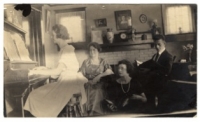 As part of the Global Urban Humanities Initiative Colloquium called Reading Cities, Sensing Cities we have asked students and visitors to write responses to each of the weekly guest lectures. October 23, 2014 Urban Space, Spectacle, Memory and Music in Nineteenth-Century Vienna Nicholas Mathew (Music) Presentation available here. Video of the conversation available here. Mathew presented on the role of music and sound in the emergence of modern civic sensibilities in Napoleonic Vienna, and how printed music came to shape a new politics of urban pedestrianism. by Matthew Goodman This week’s lecture provided an interesting glimpse into how music shaped…
As part of the Global Urban Humanities Initiative Colloquium called Reading Cities, Sensing Cities we have asked students and visitors to write responses to each of the weekly guest lectures. October 23, 2014 Urban Space, Spectacle, Memory and Music in Nineteenth-Century Vienna Nicholas Mathew (Music) Presentation available here. Video of the conversation available here. Mathew presented on the role of music and sound in the emergence of modern civic sensibilities in Napoleonic Vienna, and how printed music came to shape a new politics of urban pedestrianism. by Matthew Goodman This week’s lecture provided an interesting glimpse into how music shaped…
